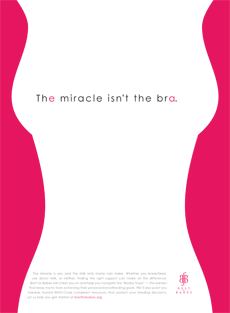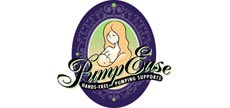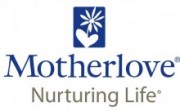When we tell people we are in the boob business this is what we hear:
1) What’s the big deal? Aren’t most moms breastfeeding?
No. Although 64% of new mothers try breastfeeding, only 14% make it to the minimum six months exclusive breastfeeding recommended by the American Academy of Pediatrics. Worse, most throw in the towel in the first few weeks. Compare that to Sweden’s rates of 99% initiating and 79% nursing at 6 months, respectively, no wonder the U.S. has one of the lowest rates of breastfeeding among all industrialized nations. Thousands of needless deaths, and billions in health care costs in the U.S. could be prevented by raising our national breastfeeding rate.
Especially shocking is that breastfeeding rates actually declined from 70% in 2002 to 63.6% in 2006 following the Government’s $40 million ad campaign highlighting the risks of not breastfeeding. This nearly invisible campaign was botched under powerful lobbying pressure from the formula companies-who increased their own advertising budgets from $30 million to $50 million while the ads ran. To top it off, the government buckled to pressure and held back a press release on a major meta-study underscoring the risks of not breastfeeding (see below)-information that prospective parents DESERVE to have.
2) I wasn’t breastfed and I turned out fine.
Another way of looking at this statement is to compare it to statements like “I didn’t wear a seatbelt when I was a kid and I turned out fine” or “I didn’t wear sunscreen as a kid and I don’t have skin cancer.”
For the first example, seatbelts, we all know by now that seatbelts save lives, mostly because of a brilliant ad campaign that drummed it into our heads, and statistics on crash fatalities involving seatbelts or lack thereof. Luckily for the seatbelt campaign, there were various industries that benefitted from seatbelt laws: automakers that installed them meaning new cars had to be purchased, and law enforcement that could fine if people were not wearing seatbelts! Most importantly, there were no industries that were lobbying against or advertising against wearing seatbelts, as it would be really bad public relations. Not so for breastfeeding. It gets lobbied against and combined marketing budgets total in the billions.
In the second example, skin cancer, it’s somewhat like the first; we know frying in the sun without sunscreen increases the risk of skin cancer, and effective advertising campaigns combined with industries that stand to benefit made for a great combination in educating the public.
But what if you add “yet” to the end of the sunscreen sentence? “I didn’t wear sunscreen, and I don’t have skin cancer, yet”. That’s really what we should hear when someone says “I wasn’t breastfed, and I turned out fine.” You may be fine for now. And we don’t want to scare anyone, but everybody is working really hard to sweep the risks of formula under the rug, and that is not right, or ethical. Parents deserve to know what the risks are, so they can make the best decision for themselves and their families.
So why do so many people seem “fine”? Well, for one thing, most people are not aware of the risks of not breastfeeding, so they are not thinking, I have digestive problems, or allergies, or diabetes, and it could be because I wasn’t breastfed. So when people say, “I turned out fine,” we try not to debate on an individual basis, because every person is different! Some people we know smoked like a chimney their whole lives and never got cancer, but nobody would dream of saying “smoking is fine.”
One thing people might want to consider is that times have changed. Our immune systems need all the help they can get given an increase in environmental stress, overuse of antibiotics, increase in vaccines (and the autoimmune diseases that may be related to that). While the previous generation may have turned out fine not so for this generation, that has drastically increased rates of obesity, diabetes, Crohn’s disease, allergies and autism, to name a few. Our view is that babies nowadays especially need all the help they can get, and that means breastmilk, either from the mother, or screened, pasteurized, donated human milk.
Here is an excellent summary* of the news release that was withheld under the influence of formula lobbyists:
Breastfeeding reduces babies’ risk of these diseases by:
- Sudden Infant Death Syndrome (SIDS): 36%
- Type 1 Diabetes: 19-27%
- Type 2 Diabetes: 39%
- Leukemia (acute lymphocytic) : 19%
- Leukemia (acute myelogenous): 15%
- Asthma: 27%
- Gastrointestinal infections: 64%
- Lower respiratory tract diseases: 72%
- Atopic dermatitis: 42%
- Acute otitis media: 50%
And breastfeeding reduces mothers‘ risk of these diseases by:
- Type 2 Diabetes: 4-12%
- Ovarian cancer: 21%
- Breast cancer: 28%
*(from Motherwear’s breastfeeding blog, “This information comes from a new meta-analysis (study of studies) from the U.S. Department of Health and Human Services. This study looked over 9,000 studies on breastfeeding from developed countries, weeded out the ones with poor methodology, and came up with an overall percentage for each one. This is harder than it sounds because “breastfeeding” is defined differently in each study.”)


 @BestforBabes
@BestforBabes Best For Babes
Best For Babes







I breastfed both my kids and they rarely miss school due to strong immune system. I highly recommend and support it.
This is an outstanding post with priceless information. I wish that the American public knew these facts. Thank you for all of the work you do. Imagine how rates of chronic illness and disease would change in the U.S. if every mom made an informed decision, reached her breastfeeding goals and was supported throughout the entire process.
Fascinating…and I agree with all of it. Keep up the great work…I will undoubtedly be back shortly